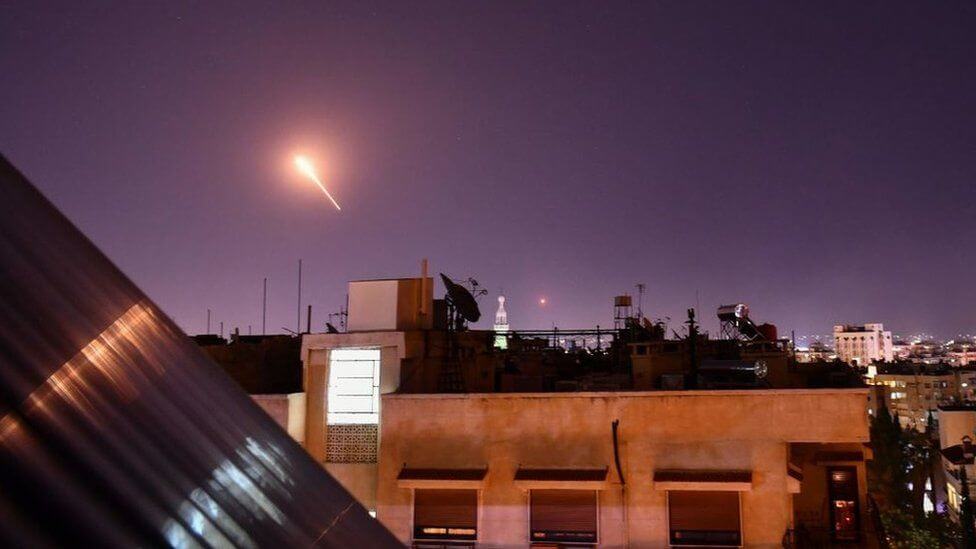On Thursday, Israel launched airstrikes on Syria after a missile landed near its Dimona nuclear facility in the Negev desert. Officials expressed concern over the failure of Israel’s vaunted air defence systems to intercept the missile. “In most cases, we achieve other results. This is a slightly more complex case. We will investigate it and move on,” said Israeli Defence Minister Benny Gantz.
Initially, it was unclear where the missile was launched from. Later, however, Jerusalem Post reported that the projectile was fired from Daraa in Syria’s south following an Israeli airstrike in the Golan Heights. The missile was identified as a Soviet-era SA-5 surface to air missile and was likely fired by Syrian air defences to counter the Israeli air raid. The Israel Defence Forces (IDF) also said that it was an “errant” missile that strayed into Israeli airspace and not a deliberate attempt to target Israel’s nuclear reactor.
In response, the Israeli Air Force (IAF) launched retaliatory airstrikes near the town of Dumair, 40 kms from the Syrian capital Damascus, Reuters reported. IDF confirmed the strikes by tweeting: “we struck the battery from which the missile was launched and additional surface-to-air batteries in Syria.” However, Syrian state news agency SANA reported that Syrian air defences repelled the Israeli attack and “downed most of the hostile missiles.” It also said that the airstrikes injured four soldiers and resulted in some material damage. The Syrian foreign ministry called the strikes an “Israeli aggression” and urged the United Nations Security Council (UNSC) to condemn Israel’s violations of Syria’s sovereignty.
IDF immediately launched a probe into the failure of Israeli air defence systems in intercepting the missile. Israel has been bolstering its air defences for a long time in anticipation of a major missile attack. Accordingly, it has built a multi-tiered missile defence system that is aimed at protecting the country from short-range artillery shells as well as ballistic missiles. Israel’s Iron Dome air defence system gained global attention in 2012, when it was intercepted 85% of projectiles launched into Israel. In 2014, the system improved its performance by thwarting 90% of missiles launched from Gaza into major Israeli cities. Israeli intelligence has also reported that Lebanese militant group Hezbollah has been stockpiling long ranges missiles, including Iranian Fateh rockets. In this regard, Israel’s failure to stop Syrian projectiles will most likely be seen as a setback to the country’s defence programme.
Reacting to the news, United States (US) State Department spokesperson Ned Price said that the US “supports Israel’s ability to exercise its inherent right of self-defence.” In response to a question about a possible Iranian role, Price said that he did not have any confirmation.
The incident came just a few weeks after Iran’s Natanz nuclear plant was sabotaged earlier this month. Iran blamed Israel for the attack and vowed to retaliate. Iranian Foreign Minister Mohammad Javad Zarif had said in response to the attack on Natanz that Iran “will take revenge for these actions from the Zionists.” On Thursday, the Deputy Commander of Iran’s Quds forces, Gen. Mohammad Reza Fallahzadeh, also said that “the occupier Zionist regime should know that resistance groups are stationed all over the planet next to their bases and are bringing them closer to collapse at any moment.” The statement was, however, not a response to the explosion near Dimona.
Israel and Iran have been engaged in a proxy war for a long time and both sides have clashed in Syria on numerous occasions since the start of the decade-old civil war. Israel has conducted about 1000 airstrikes in Syria since the start of the war, over what it believes to be Iranian weapon shipments to Hezbollah.
Israel Retaliates With Air Strikes as Syrian Missile Explodes near Dimona Nuclear Reactor
Officials expressed concern over the failure of Israel’s vaunted air defence systems to intercept the missile.
April 23, 2021

SOURCE: BBC via GETTY IMAGES
